Hiring a Solutions Engineer can be a game-changer for companies looking to bridge the gap between technical products and customer needs. However, many organizations struggle to find the right fit, often underestimating the unique blend of technical expertise and business acumen required for this role. A successful Solutions Engineer not only understands complex technical systems but also excels in communicating their value to non-technical stakeholders.
This guide will walk you through the process of hiring a top-notch Solutions Engineer, from understanding the role to crafting an effective job description and conducting insightful interviews. We'll also explore technical aptitude tests and other screening methods to ensure you find the best candidate for your team.
Table of contents
Why Hire a Solutions Engineer?
To decide if you need a Solutions Engineer, start by identifying your company's technical challenges. Are your clients struggling to integrate your products? Is there a gap between your sales team's promises and your product's capabilities?
Solutions Engineers bridge the gap between technical and business aspects. They can:
- Customize solutions for complex client needs
- Provide technical expertise during sales processes
- Improve product adoption and client satisfaction
Consider hiring a full-time Solutions Engineer when you consistently need technical expertise in client-facing roles. For occasional needs or to test the waters, working with a consultant or service provider might be a good starting point.
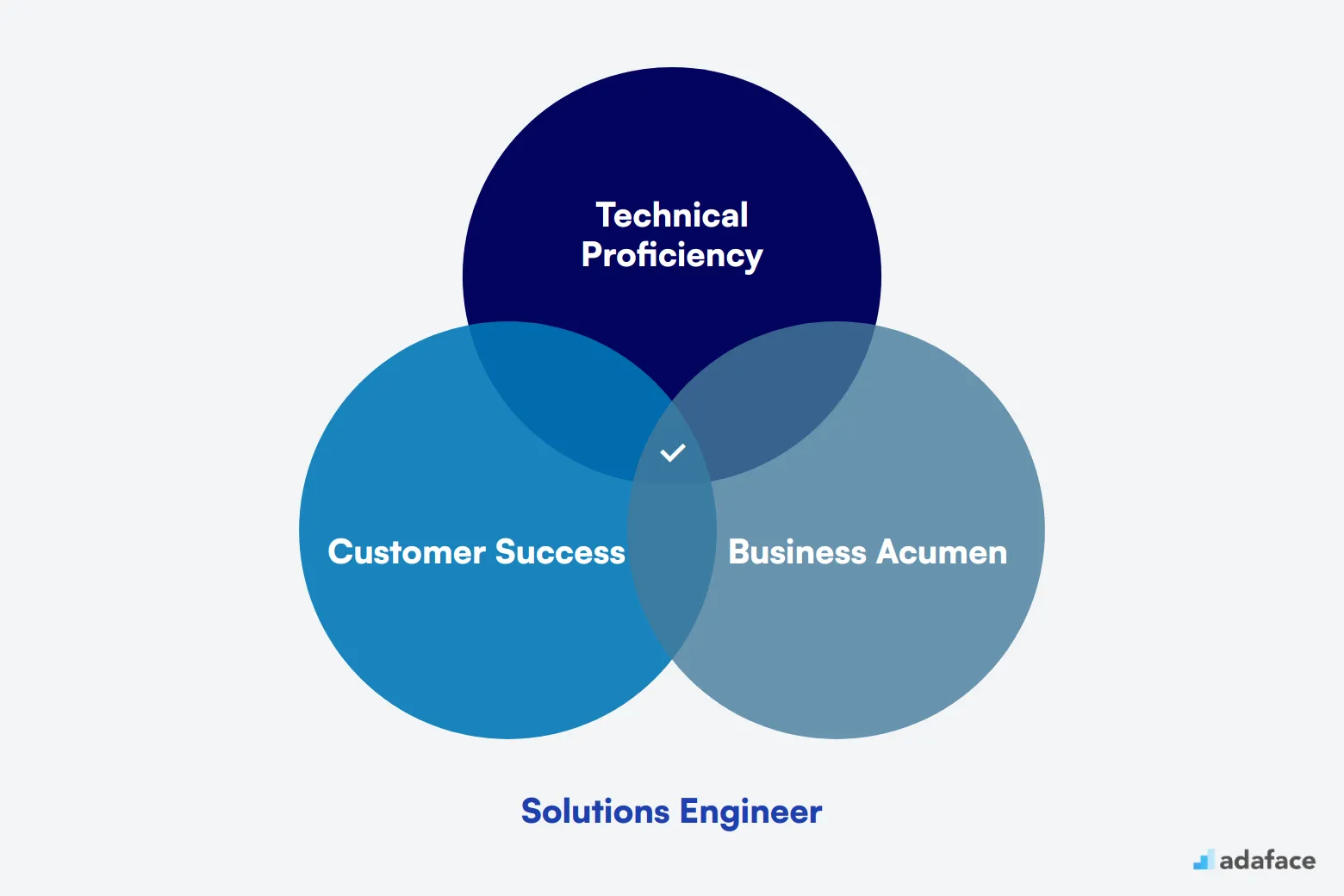
What Does a Solutions Engineer Do?
A Solutions Engineer acts as a bridge between technical teams and clients. They work to understand client needs and translate them into practical, technical solutions using their company's products or services.
The day-to-day tasks of a Solutions Engineer include:
- Collaborating with sales teams to craft tailored technical proposals
- Conducting product demos and presentations for clients
- Troubleshooting complex technical issues
- Providing technical support and guidance throughout the implementation process
- Staying updated on industry trends and emerging technologies
- Gathering client feedback to improve products and services
Solutions Engineer Hiring Process
Hiring a Solutions Engineer typically involves a structured process that spans about 6-8 weeks. This guide will walk you through the essential steps to ensure you find the right candidate for this technical role.
- Define the Job Description: Start by crafting a detailed job description that outlines the responsibilities, required skills, and qualifications. This will help attract the right applicants.
- Post the Job: Once your job description is ready, post it on relevant job boards and your company's careers page. Expect to receive applications within the first week.
- Resume Screening: After a week of receiving applications, begin the screening process. Filter candidates based on their experience and qualifications.
- Skill Assessment: Next, send shortlisted candidates to skill assessments. You can choose from various tests tailored for Solutions Engineers, including technical skills and problem-solving abilities. Allow about a week for this step.
- Interviews: Arrange interviews for candidates who performed well in the assessments. This stage usually involves both technical and behavioral interviews to gauge fit and expertise.
- Final Selection and Offer: After the interviews, select your top candidate and extend a job offer. This final step should be quick, ideally within a week after the interviews.
In summary, the hiring process for a Solutions Engineer takes about 1.5 to 2 months from start to finish. By following these steps, you can streamline your recruitment and find the best talent efficiently. We'll now explore each of these steps in detail, providing handy resources and checklists to aid your hiring journey.
Skills and Qualifications to Look for in a Solutions Engineer
Hiring a Solutions Engineer can be tricky; making sure you define the right candidate profile is critical. What may be a must-have skill in one organization might be a mere preference in yours. Failing to identify these nuances can lead to misalignment in your hiring process.
To streamline your recruitment efforts, it's important to distinguish between required and preferred skills. This will help you attract candidates who not only fit your immediate needs but also possess additional qualities that could benefit your organization in the long run.
| Required skills and qualifications | Preferred skills and qualifications |
|---|---|
| Bachelor's degree in Computer Science, Engineering, or related field | Experience with cloud platforms (AWS, Azure, or GCP) |
| 3+ years of experience in a technical customer-facing role | Knowledge of API integration and web services |
| Strong programming skills in at least one language (e.g., Python, Java, JavaScript) | Familiarity with database technologies (SQL and NoSQL) |
| Excellent problem-solving and analytical skills | Experience with DevOps practices and tools |
| Strong communication and presentation abilities | Relevant industry certifications (e.g., AWS, Salesforce) |
How to write a Solutions Engineer job description?
Once you've established a candidate profile, the next step is to translate this information into a job description that attracts the right talent. For a Solutions Engineer role, the job description must be precise and appealing to potential candidates.
- Define key responsibilities and impact: Clearly outline the responsibilities and expected outcomes for the role. A Solutions Engineer often bridges technical and business teams, so the role's strategic importance in driving client success and satisfaction should be emphasized. This clarity helps candidates understand the role's significance.
- Balance technical skills with industry knowledge: While technical skills such as proficiency in cloud platforms and solution design are important, emphasize the need for industry expertise and soft skills like effective communication and collaboration. This ensures you attract candidates who are not just technically sound but also adept at understanding client needs.
- Showcase what makes your company unique: Highlight aspects such as innovative projects, opportunities for growth, and a dynamic team environment. This can set your role apart from others and appeal to top talent. More details on crafting a compelling job description can be found in our Solutions Engineer job description resource.
Top Platforms to Source Solutions Engineers
Once you've crafted the perfect job description, the next step is to post it on job listing platforms to source potential candidates. Finding the right platforms to list your Solutions Engineer position is key to attracting qualified applicants who fit your company culture and needs.
Ideal for sourcing experienced full-time Solutions Engineers with a professional background and networking opportunities.

Indeed
Useful for listing full-time job descriptions and reaching a broad audience of job seekers across various industries.

Dice
Specialized platform for technical roles, making it easier to find qualified Solutions Engineers.
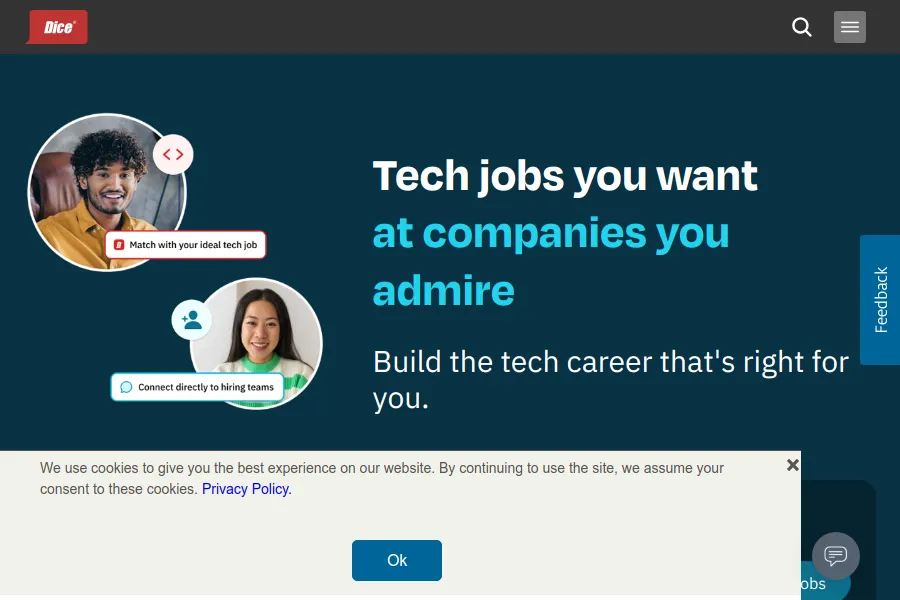
After considering the first set of platforms, you can also explore options like AngelList for startup-focused environments or FlexJobs for remote opportunities. Platforms like Upwork and Toptal are ideal for freelance projects, providing access to top-tier talent. For tech-specific roles, Hired is a great choice with its focus on skilled professionals. Lastly, posting on Glassdoor not only shares your job listings but also enhances your company's visibility through reviews. To ensure your candidates have the technical chops, check out our coding tests.
Screening Solutions Engineer Resumes: Keywords and Strategies
Resume screening is a time-saving step in the hiring process for Solutions Engineers. It helps filter out unsuitable candidates and focus on those who match your requirements.
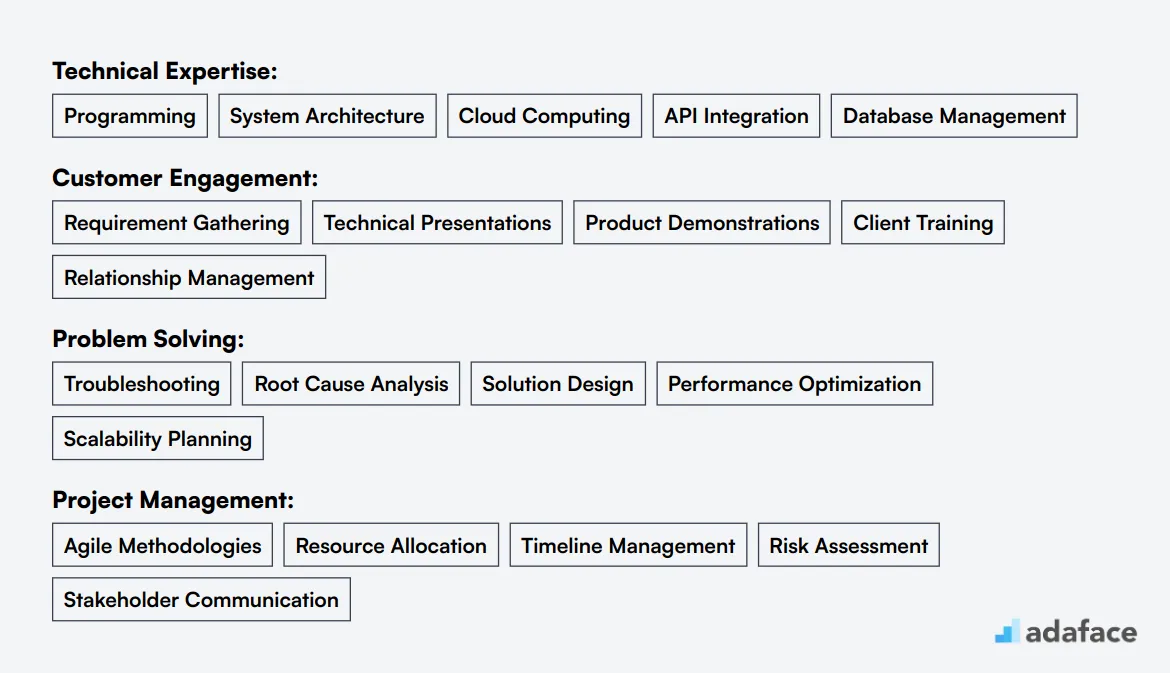
When manually screening resumes, look for key technical skills like programming languages (Python, Java), cloud platforms (AWS, Azure), and API integration. Also, check for customer-facing experience and problem-solving abilities.
AI-powered tools can streamline the screening process. You can use language models like GPT to analyze resumes based on specific criteria, saving time and improving accuracy in candidate selection.
Here's a sample prompt for AI-assisted resume screening:
TASK: Screen resumes for Solutions Engineer role
INPUT: Resumes
OUTPUT:
- Candidate Name
- Matching keywords
- Score (out of 10)
- Shortlist recommendation
KEYWORDS:
- Programming (Python, Java, JavaScript)
- Cloud platforms (AWS, Azure, GCP)
- API integration
- Database management
- Customer-facing experience
- Problem-solving skills
Customize this prompt based on your specific job requirements and company needs.
Recommended Skills Tests to Screen Solutions Engineers
Hiring a Solutions Engineer can be a critical decision for your tech team, and skills tests are an effective way to ensure candidates possess the necessary expertise. They help identify the best fit for your organization by assessing technical and problem-solving skills.
Problem-Solving Test can be a key indicator of a candidate's ability to handle the challenges of a Solutions Engineer role. The test evaluates logical reasoning and analytical abilities, which are crucial for diagnosing and resolving technical issues.
The Technical Aptitude Test is an excellent tool to gauge the candidate's understanding of core engineering principles. It assesses their ability to apply technical skills in real-world scenarios, making it a valuable addition to your hiring process.
For those Solutions Engineers working with cloud infrastructure, the Cloud Computing Online Test offers insights into their knowledge of cloud platforms and services. It targets skills in cloud architecture and implementation, which are often part of a Solutions Engineer's responsibilities.
The DevOps Online Test is important if your organization emphasizes integration and deployment processes. This test covers a mix of skills including system administration and automation, which are integral to a Solutions Engineer's toolkit.
Finally, the System Administration Online Test measures a candidate's ability to manage and troubleshoot IT environments efficiently. Strong system administration skills are often required for Solutions Engineers to ensure seamless operations in complex systems.
How to structure interview stage for hiring Solutions Engineers?
After conducting skills tests to filter out unsuitable applicants, the next step is the technical interview stage. This is where you evaluate the hard skills necessary for a Solutions Engineer role. Skills tests are great for narrowing down your list of candidates but may not capture the best fit for your specific requirements. Therefore, technical interviews are crucial in assessing whether a candidate has the necessary skills.
During the interview, consider asking questions like: "Can you describe a project where you integrated multiple technology solutions?" to gauge their practical experience. "How do you approach troubleshooting a complex issue?" helps assess problem-solving skills. Ask them to "Explain the difference between a solution architect and a solutions engineer," which tests their understanding of roles. "How would you manage a client's expectations during a technical setback?" evaluates their communication skills. Lastly, "What tools have you used for automating deployment processes?" checks their familiarity with essential technology. These questions help in understanding the depth and breadth of a candidate's expertise, aligning with the skills required for solutions engineer.
How Much Does It Cost to Hire a Solutions Engineer?
The cost to hire a Solutions Engineer can vary significantly based on factors like location and experience. In the United States, salaries typically range from $77,202 to $195,352 per year, with an average around $131,133. In India, the salary range is broad as well, from ₹484,531 to ₹1,739,596 annually, with a median of ₹918,089. Tech hubs like San Francisco, New York, and Bengaluru often offer higher salaries, reflecting the competitive market in these regions.
Solutions Engineer Salary in the United States
The average salary for a Solutions Engineer in the United States is around $131,133 per year. Salaries can range from a low of about $77,202 to a high of $195,352, depending on factors like location and experience. Major cities such as San Francisco and New York tend to offer higher salary ranges, reflecting the competitive nature of tech hubs.
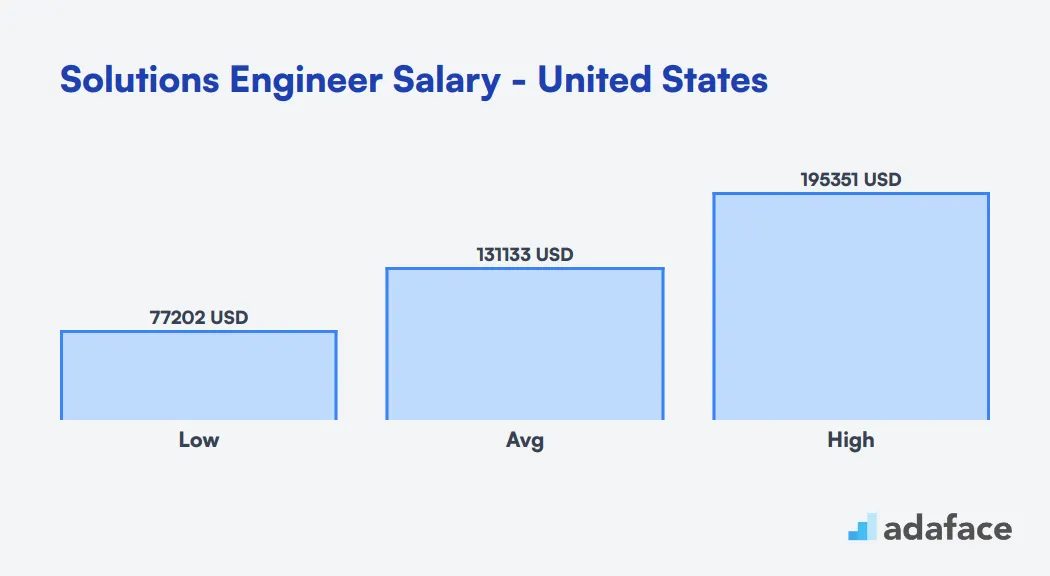
Solutions Engineer Salary in the United Kingdom
In the United Kingdom, Solutions Engineers can expect competitive salaries. While specific data for the UK is not provided, we can draw insights from global trends. Solutions Engineers typically earn above-average salaries due to their technical expertise and business acumen.
Salaries can vary based on factors like experience, location, and company size. For the most accurate and up-to-date information, it's best to consult local salary surveys or job market reports specific to the UK tech industry.
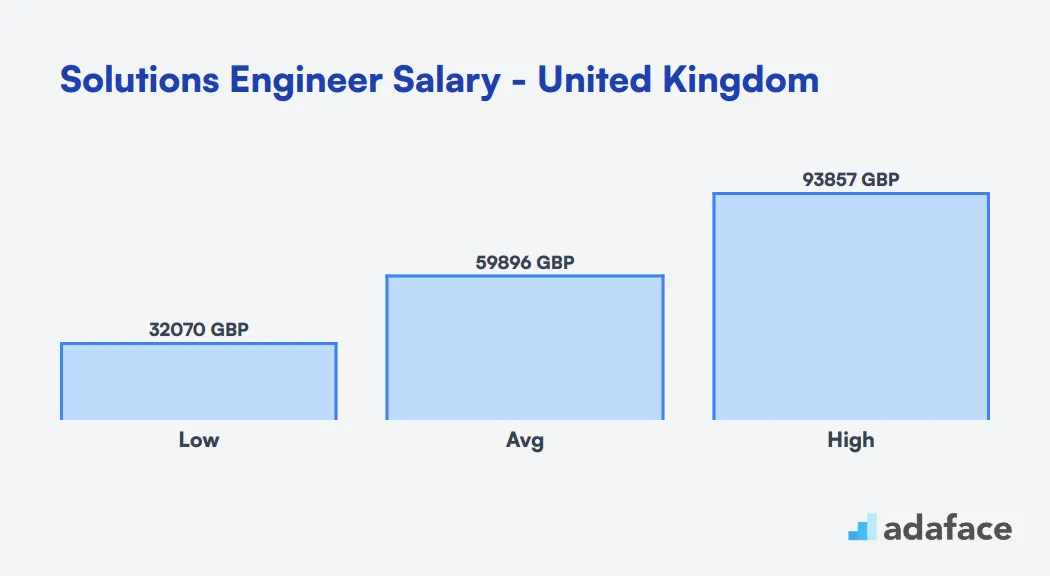
Solutions Engineer Salary in India
In India, the average salary for Solutions Engineers ranges from ₹484,531 to ₹1,739,596 per year. The median salary stands at ₹918,089, with variations based on location, experience, and company size.
Bengaluru offers competitive salaries, with a median of ₹1,034,761. Mumbai and Delhi have lower medians at ₹555,471 and ₹520,566 respectively. Gurgaon tops the list with a median of ₹1,113,213, making it an attractive location for Solutions Engineers.
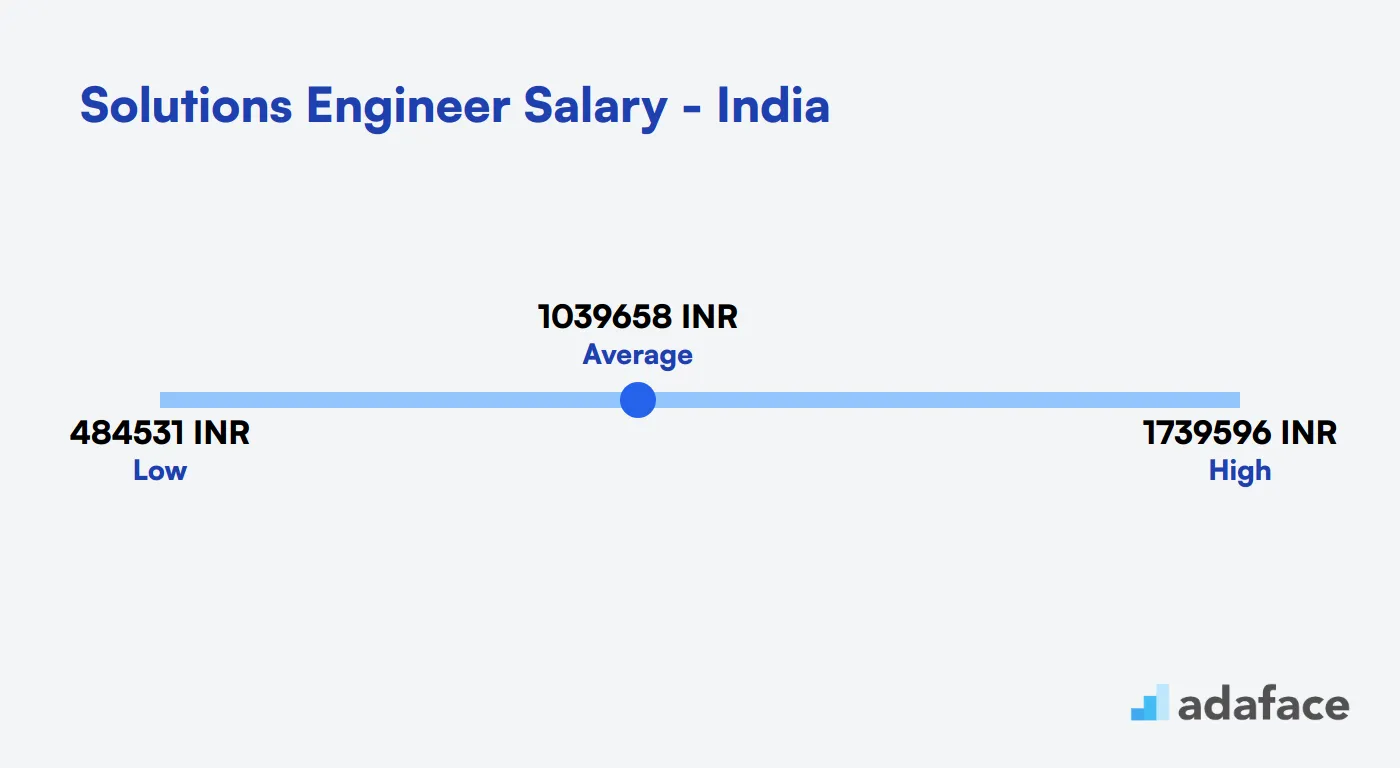
What's the difference between a Pre-Sales Solutions Engineer and a Post-Sales Solutions Engineer?
While both Pre-Sales and Post-Sales Solutions Engineers play important roles in the sales and support lifecycle, they focus on different stages of client interaction. This distinction often leads to confusion, as their titles sound similar, yet their responsibilities are quite distinct.
Pre-Sales Solutions Engineers concentrate on supporting the sales team by providing technical demonstrations, conducting proof of concepts (POCs), and preparing responses for requests for proposals (RFPs). Their primary focus is to persuade potential clients through presentations and technical sales pitches. They frequently collaborate with sales teams and prospects, traveling often to client sites.
In contrast, Post-Sales Solutions Engineers ensure customer success after the sale. Their responsibilities revolve around deployment, integration, and customization of solutions. They work closely with customer success and support teams, focusing on training and troubleshooting. Their travel requirements are less frequent, typically for post-sale support. Successful implementations and customer satisfaction are key indicators of their performance.
For more insights on the skills required for solutions engineers, explore our blog post.
| Pre-Sales Solutions Engineer | Post-Sales Solutions Engineer | |
|---|---|---|
| Primary Focus | Sales support and technical demonstrations | Implementation and customer success |
| Client Interaction Stage | Before sale | After sale |
| Technical Skills | Broad knowledge, demo-oriented | Deep product expertise, implementation-focused |
| Communication Skills | Presentation and persuasion | Training and troubleshooting |
| Key Responsibilities | POCs, RFPs, technical sales pitches | Deployment, integration, customization |
| Collaboration | Sales team, prospects | Customer success, support teams |
| Success Metrics | Deals won, pipeline influence | Customer satisfaction, successful implementations |
| Travel Requirements | Frequent, client-site visits | Occasional, post-sale support |
What are the ranks of Solutions Engineers?
Solutions Engineers often find themselves confused with other roles in tech, such as software engineers or system analysts, due to overlapping skills. However, each rank has its distinct responsibilities and focus areas that contribute to a company's success.
• Entry-Level Solutions Engineer: This is typically the starting position for individuals entering the field. They assist in customer implementations, troubleshoot basic issues, and support senior engineers with projects to gain hands-on experience.
• Solutions Engineer: At this level, professionals have developed a deeper understanding of the products and customer needs. They engage directly with clients, customizing solutions and demonstrating product capabilities while addressing any technical challenges.
• Senior Solutions Engineer: A Senior Solutions Engineer leads complex projects and serves as a mentor for junior engineers. They analyze customer requirements more strategically and often collaborate with sales teams to ensure alignment with client goals.
• Lead Solutions Engineer: In this role, an engineer oversees a team of solutions engineers, providing guidance and direction on projects. They are responsible for high-stakes client interactions and ensuring that their team delivers tailored solutions effectively.
• Solutions Architect: Solutions Architects focus on designing and implementing solutions that align with business needs and technical specifications. They bridge the gap between client requirements and technical execution, often working with multiple departments to ensure comprehensive solutions.
Hire the Best Solutions Engineers for Your Team
We've covered the key aspects of hiring Solutions Engineers, from understanding their role to crafting effective job descriptions and conducting interviews. The hiring process for this unique position requires careful consideration of technical skills, business acumen, and interpersonal abilities.
If there's one takeaway from this guide, it's the importance of using accurate job descriptions and targeted skills assessments to make your hiring process more effective. Consider using a technical aptitude test to evaluate candidates' problem-solving abilities and technical knowledge. This approach will help you identify top talent and build a strong Solutions Engineering team.
Software Engineering Online Test
FAQs
When hiring a Solutions Engineer, look for a combination of technical skills and soft skills. Key technical skills include proficiency in relevant programming languages, understanding of system architecture, and knowledge of cloud platforms. Soft skills should include excellent communication, problem-solving abilities, and customer-facing experience.
To effectively screen Solutions Engineer candidates, use a combination of methods. Start with resume screening focusing on relevant experience and skills. Follow up with technical aptitude tests to assess their technical knowledge. Finally, conduct initial phone or video interviews to evaluate communication skills and problem-solving abilities.
A Solutions Engineer job description should include key responsibilities such as developing technical solutions, collaborating with sales teams, conducting product demonstrations, and providing customer support. It should also list required technical skills, desired soft skills, and any industry-specific knowledge or certifications needed.
Qualified Solutions Engineer candidates can be found through various channels. Use professional networking sites like LinkedIn, attend industry conferences and events, post on specialized job boards, and leverage your company's network. Additionally, consider partnering with technical recruitment agencies or using remote hiring platforms to expand your candidate pool.
Structure the interview process for a Solutions Engineer in multiple stages. Begin with a phone or video screening to assess basic qualifications and communication skills. Follow up with a technical interview to evaluate their depth of knowledge. Include a practical assessment or case study to see how they approach real-world problems. Finally, conduct a cultural fit interview with team members they'll be working closely with.
Pre-Sales Solutions Engineers typically work closely with the sales team to help win new business. They focus on demonstrating products, creating technical proposals, and addressing potential customers' technical questions. Post-Sales Solutions Engineers, on the other hand, work with existing customers to ensure successful implementation, provide ongoing support, and identify upsell opportunities.
The hiring process for a Solutions Engineer can vary, but it typically takes 4-8 weeks from job posting to offer acceptance. This timeline can be influenced by factors such as the urgency of the role, the availability of qualified candidates, and the complexity of your interview process. Using efficient screening methods like pre-employment assessments can help streamline the process.

40 min skill tests.
No trick questions.
Accurate shortlisting.
We make it easy for you to find the best candidates in your pipeline with a 40 min skills test.
Try for freeRelated posts
Free resources



